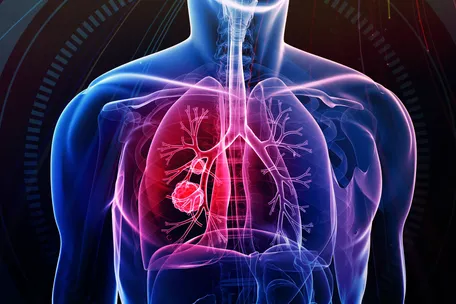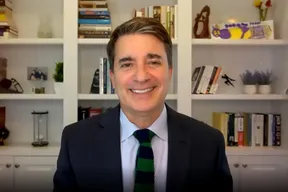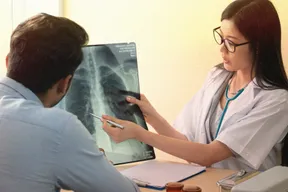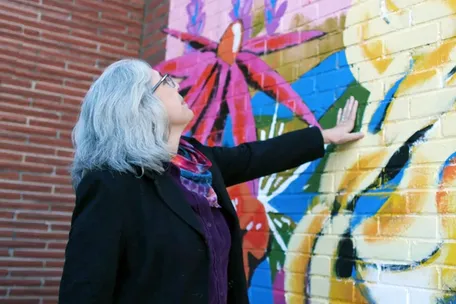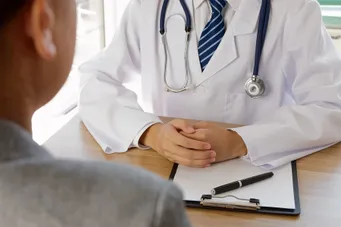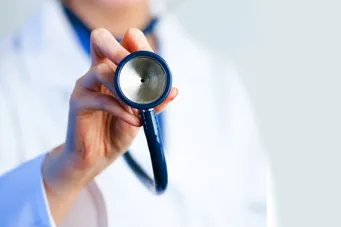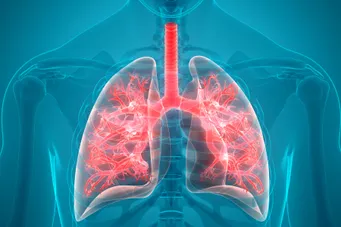[MUSIC PLAYING]
JOHN WHYTE: Welcome, everyone.
I'm Dr. John Whyte, the Chief
Medical Officer at WebMD.
Let's talk cancer, specifically
lung cancer.
It's the leading cause of cancer
deaths among men and women.
250,000 new cases a year,
130,000 deaths every year.
80% of lung cancer is something
called nonsmall cell lung
cancer.
So where are we today in terms
of diagnosis,
treatment, and what does
the future hold?
So to help answer
these questions, I've asked two
experts.
Dr. Jyoti Patel, she's
the Associate Vice Chair
for Clinical Research
in the Department
of Medicine at Northwestern,
and Dr. Benjamin Levy,
he's an Associate Professor
of Medicine at Johns Hopkins
School of Medicine.
Doctors, thanks for joining me.
JYOTI PATEL: Thank you for the--
BENJAMIN LEVY: Thank you.
JOHN WHYTE: Well, let's start
off with, patients will often
talk about lung cancer,
but as I pointed out,
there's different types of lung
cancer.
So for our audience, Dr. Patel,
could you explain
the different types of lung
cancer?
JYOTI PATEL: Sure.
Thanks very much.
So lung cancer is much more
heterogeneous than we ever
thought.
There are two predominant kinds.
One is nonsmall cell lung cancer
and that accounts for about 85%
of all lung cancer.
The other is small cell lung
cancer, and that is decreasing
in incidence,
but is still
a substantial amount of people,
given the fact that lung cancer
is so common.
We break down small cell lung
cancer down into different types
based on what the cancer cells
look like under the microscope.
So adenocarcinoma is the most
common, well by squamous cell
tumors, followed by large cell
cancers.
All of these distinctions
have relevance in treatment
opportunities for patients
and treatment pathways
for patients.
JOHN WHYTE: And then Dr. Levy,
what are the risk factors
for nonsmall cell lung cancer?
BENJAMIN LEVY: It's such
a great question.
I think we're still trying
to learn about potential risk
factors.
Of course, smoking is one.
That's the big one.
We know that there's
an intimate association
with cigarette smoking
and the development
of nonsmall cell lung cancer.
Second hand smoke, patients that
were exposed to secondhand smoke
growing up with family members
or close friends who were
smoking that they were around,
that's a risk factor.
And then we get down into some
of the others and we're still
learning.
Certainly radon is something
that's in the soil and rock that
can potentially lead
to the development of lung
cancer.
There's been some nice studies
looking at the link
between radon exposure and lung
cancer.
And they we're really,
beyond that,
trying to understand
other potential causes.
There's been some hints
and clues from some studies
that there may be
environmental exposures
and the worse
the environmental pollution,
the more likely
you are to develop lung cancer.
And I think we still don't know
some of the risk factors
for lung cancer,
specifically for those patients
who either never smoked
and have never had second hand
smoke exposure.
JOHN WHYTE: What percentage,
roughly, are nonsmokers?
BENJAMIN LEVY: So this is data
that we've come to learn all too
well, that never smoking lung
cancer is roughly 20%
of all nonsmall cell lung
cancer.
That's a big chunk.
JOHN WHYTE: Sure, yeah.
BENJAMIN LEVY: As does never
smoking.
And then if we expand that
and look at either never smokers
or smokers who quit more than 10
years ago, that number
goes to about 60%.
So this is not a current smoking
disease, although that's
something that's out there.
We need to destigmatize this
in some ways to understand this.
JOHN WHYTE: Absolutely.
Viewers should be aware
that just because you're not
a smoker
doesn't mean that you can't get
lung cancer.
So Dr. Patel, how do patients
present?
Is it cough?
Is it weight loss?
JYOTI PATEL: Most patients
with nonsmall cell lung cancer
present, unfortunately,
with symptoms, and generally,
that means that the cancer is
more advanced.
So symptoms can come
from the primary tumor causing
pulmonary symptoms like cough
or shortness of breath.
It can come off
it's metastasized
to another area.
So pain in a joint, for example,
bony pain.
A lot of people will describe
weight loss and fatigue that's
preceded their diagnosis
for some time.
Those are all
significant changes.
Clearly, someone is coughing
more, coughing up blood should
seek
immediate medical attention.
But often in retrospect,
the symptoms are subtle.
So sort of knowing your body
and seeking medical attention.
We want to change this, though.
We really want to get more
people who have early stage
disease when the cancer is
curable and gives us the most
opportunities for treatment.
And so finding patients
with early stage disease,
which only represent
about a quarter of all patients
diagnosed with lung cancer,
really means implementing
screening programs for patients
who are appropriate who have
a history of smoking.
JOHN WHYTE: Well, let's talk
about those screening
guidelines, specifically
as it relates to the number
of years of smoking and age.
It's not about chest X-ray.
We stopped that a long time ago
as a way to find, to screen lung
cancer.
Dr. Levy, what's
the current recommendations
for screening for nonsmall cell
lung cancer?
BENJAMIN LEVY: Yeah, I think
this has certainly moved
in the past few years.
We know that, based
on a seminal work, The National
Lung Cancer Screening Trial,
NLST, that CT screens low dose
helical CT scans in a high risk
group, leads to decreased lung
cancer mortality when
compared to a chest X-ray.
So we're talking
about screening.
We are talking about low dose
helical CT scans annually.
The current guidelines are
for patients who have a 20 pack
a year history of smoking,
or more,
smoke now or have quit
within the past 15 years,
and are
between the ages of 50 and 80.
So that's a wide group
of patients.
I think
that whether this increases
and the guidelines
get a little bit more flexible,
we'll see.
But clearly, we know that if we
apply CT screening
to this group,
that lives can be saved
and we can reduce lung cancer
mortality.
JOHN WHYTE: So as I referenced,
it's still the number one cause
of cancer death, even as smoking
rates have decreased.
What are the current treatments
available to patients?
BENJAMIN LEVY: Well, it really
is divergent based on a host
of factors.
Obviously, we still have
chemotherapy for patients
and some of the chemotherapy
that we offer
to our nonsmall cell lung
cancer patients is not
the chemotherapy of the 1970s
or '80s.
These are newer drugs that are
better tolerated.
So certainly, chemotherapy
is a potential option
for some patients.
Clearly more exciting are some
of the newer therapies
or class of therapies.
Immunotherapy, which I'm
sure many patients have heard
of, this is a class of drugs
that turns the patient's
own immune system
against the cancer.
And there's many ways to do that
and many patients are
eligible for this type
of treatment.
And we may find out
that while this immunotherapy
works well in a stage four
setting,
it may be able to be
leveraged in earlier stages
of disease.
And then finally, I would say
targeted therapy, which I always
have to have this distinction
when I talk to patients.
There's immunotherapy
that harnesses the patient's
own immune system
against the cancer and then
there's targeted therapy, which
essentially is trying to go
after the genetic underpinnings
of the tumor.
So every patient should have
what we call
comprehensive genomic profiling,
or molecular testing,
or genetic testing done
on the tumor,
so that if we identify
the right gene,
we can give the right drug.
And one last thing I'll say
is, these are not genes you're
born with.
These are only genes in the lung
cancer, and we now have novel
technologies
both on biopsy specimens
and by a blood test where we can
determine
the genetic underpinnings
of a tumor
and, based on that result,
can offer
potential targeted therapies
that usually come in the form
of pills.
JOHN WHYTE: And Dr. Patel, where
are we, then, in terms of five
year survival?
Thought I might have even heard
you say the word cure.
JYOTI PATEL: So absolutely.
We've made significant impacts
in survival.
So whereas 20 years ago,
a patient diagnosed
with nonsmall cell lung cancer
was given chemotherapy,
chemotherapy was limited because
of toxicity and a response rate
that might be 30%,
a reasonable survival estimate
was less than a year for most
patients.
And now, 20 years later,
with integration
of immunotherapies and targeted
therapies, we're seeing
survivals that are
multiple years
for some patients.
And, in fact, there are patients
that we know who have had
immunotherapies
despite bulky disease,
despite prior treatments, who
remain with no evidence
of disease.
We're not sure what cure really
looks like now.
These therapies are new.
The first immunotherapies were
approved in 2015 for lung
cancer, and so that's still
a pretty short runway.
But there are patients who are
off of immunotherapies
with no evidence of disease.
Patients with targeted therapies
and genetic alterations
often also have very good
outcomes
with a single treatment,
perhaps a pill that they're
taking a couple of times a day
for three or four years.
One piece that
is important to remember
is that lung cancer has had
this tremendous evolution.
There have been
multiple approvals of novel
therapies in the past year,
and so the science is constantly
changing.
So what we think a survival
estimate is in 2021 is probably
not going to be
true for a subset of patients
in 2024.
JOHN WHYTE: I was going to ask
Dr. Levy that.
Thanks for setting that up
for me.
What does it look like in terms
of treatment five years
from now?
BENJAMIN LEVY: I think the sky's
the limit and I think a couple
of things I think about
in the next five years.
The first is looking at newer
classes of drugs that are coming
down the pike now,
some of these drugs
called antibody drug conjugates,
which may supplant chemotherapy.
These are more
selectively-driven
chemotherapies that really more
like heat seeking missiles that
will go directly to the tumor
rather than kill all rapidly
dividing cells.
So these are known as ADCs
or Antibody Drug Conjugates,
and whether we can leverage
these in combination
with targeted therapies
or immunotherapies,
I think we're really beginning
to have a significant uptick
in trials and really beginning
to understand the signals,
the safety, and efficacy signals
of these drugs.
I think potentially more
importantly is that we're going
to understand in the next five
years
how to leverage all
of these great therapies
that we have for stage four
in earlier stage disease.
I think that's where we're
really heading.
And this is the way
drug development usually works.
You start in the advanced stage
setting, and then they work
really well, and then you move
it to earlier stage.
And while we can cure
a certain amount of patience
with stage four disease now
with immunotherapy,
and that's true,
we have some data on that,
leveraging these drugs
in earlier stage
to really shoot for cure is
where I think we're going to be
in the next five years,
and that's really exciting.
And if we couple this with CT
screens
that can identify cancers
earlier
and then be able to leverage
the science that we already know
about in the stage four
and put it in the earlier stage,
I think the sky is really
the limit.
I'm really excited.
It's a fascinating time
to be in the field.
JOHN WHYTE: So Dr. Patel, what
do you say to a viewer who's
diagnosed with nonsmall cell
lung cancer?
What do they need to be doing?
JYOTI PATEL: For a patient who
is diagnosed with lung cancer,
I really urge them to become
their best advocates,
and to find out
and to learn about the disease.
The world is changing
tremendously quickly,
and so understanding
the genetic profile
of your disease
so you can ask to your physician
and really do some shared
decision making about novel
therapies or access
to clinical trials,
it's a huge piece of it.
Second is to really understand
that the world is changing
and it may be that we're using
a particular treatment now,
but that hopefully would be
a bridge to another therapy that
may be available in a year
or two that may be more
impactful.
JOHN WHYTE: What do they ask
their doctor?
Do they say, is there
a clinical trial?
Is there other treatment?
How do they ask
for that genetic profile, which
is such an important point?
JYOTI PATEL: So I think the best
outcomes come when we know
we have the most
data about the tumor
and we can really personalize
therapy recommendations.
Often when a patient is
diagnosed with lung cancer,
they want to get moving
with treatment right away.
Sometimes getting
the genetic information,
understanding
the mutational profile
may take a couple of weeks
and it is a time in which
patients feel like they're
in limbo
and don't really have a path
forward.
I would urge that, if patients
are well and tolerating
the symptoms from their cancer,
to take a step back
and understand that, probably,
cancer's been there
for some time.
Getting the right information
for the right therapies
is absolutely important.
The other piece is, we have all
of these new therapies because
of clinical trials
and a minority of our patients
in the United States
participate in clinical trials.
All of the therapies we use now
were experimental even four
or five years ago.
And so to always consider
if there's a clinical trial
option, could you be getting
something that's more innovative
that may benefit you
or could you be helping
our overall understanding
of lung cancer may
help the next person who
is afflicted with this disease.
JOHN WHYTE: I want to thank you
both again for sharing
your insights about the need
for screening,
the effective therapies
that we currently have,
as well as what's
on the horizon.
BENJAMIN LEVY: Thanks so much.
JYOTI PATEL: Thank you.
[MUSIC PLAYING]
